Related Research Articles
Interactive fiction (IF) is software simulating environments in which players use text commands to control characters and influence the environment. Works in this form can be understood as literary narratives, either in the form of Interactive narratives or Interactive narrations. These works can also be understood as a form of video game, either in the form of an adventure game or role-playing game. In common usage, the term refers to text adventures, a type of adventure game where the entire interface can be "text-only", however, graphical text adventure games, where the text is accompanied by graphics still fall under the text adventure category if the main way to interact with the game is by typing text. Some users of the term distinguish between interactive fiction, known as "Puzzle-free", that focuses on narrative, and "text adventures" that focus on puzzles.
The Interactive Fiction Competition is one of several annual competitions for works of interactive fiction. It has been held since 1995. It is intended for fairly short games, as judges are only allowed to spend two hours playing a game before deciding how many points to award it, but longer games are allowed entry. The competition has been described as the "Super Bowl" of interactive fiction.
Text Adventure Development System (TADS) is a prototype-based domain-specific programming language and set of standard libraries for creating interactive fiction (IF) games.
Graham A. Nelson is a British mathematician, poet, and the creator of the Inform design system for creating interactive fiction (IF) games. He has authored several IF games, including Curses (1993) and Jigsaw (1995).

Photopia is a piece of literature by Adam Cadre rendered in the form of interactive fiction, and written in Inform. It has received both praise and criticism for its heavy focus on fiction rather than on interactivity. It won first place in the 1998 Interactive Fiction Competition. Photopia has few puzzles and a linear structure, allowing the player no way to alter the eventual conclusion but maintaining the illusion of non-linearity.

A Mind Forever Voyaging (AMFV) is an interactive fiction game designed and implemented by Steve Meretzky and published in 1985 by Infocom. The game was intended as a polemical critique of Ronald Reagan's politics.

Andrew Plotkin, also known as Zarf, is a central figure in the modern interactive fiction (IF) community. Having both written a number of award-winning games and developed a range of new file formats, interpreters, and other utilities for the design, production, and running of IF games, Plotkin is widely recognised for both his creative and his technical contributions to the homebrew IF scene.

Starcross is an interactive fiction game written by Dave Lebling and published in 1982 by Infocom. The game was released for the IBM PC, Apple II, Atari 8-bit computers, Commodore 64, TRS-80, TI-99/4A, and later the Atari ST and Amiga. It was Infocom's fifth game and first in the science fiction genre. Starcross takes place in the year 2186, when the player's character is a lone black hole miner exploring an asteroid belt. It sold 90,315 copies.
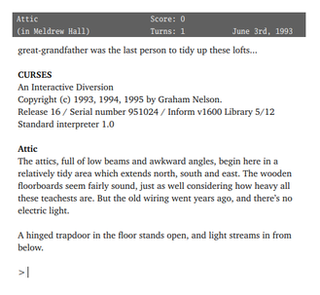
Curses is an interactive fiction computer game created by Graham Nelson in 1993. Appearing in the beginning of the non-commercial era of interactive fiction, it is considered one of the milestones of the genre.

Suspect is an interactive fiction video game designed by Dave Lebling and published by Infocom in 1984. It is the third and last murder mystery Infocom released. It was written in highly portable ZIL and released for Amiga, Amstrad CPC, Amstrad PCW, Apple II, Atari 8-bit computers, Atari ST, Commodore 64, Kaypro II, Mac, and MS-DOS. It is Infocom's fifteenth game.
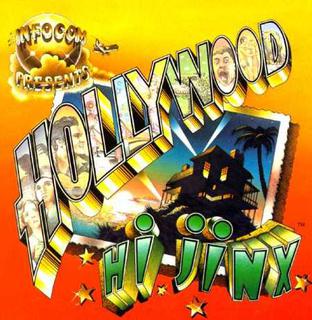
Hollywood Hijinx is an interactive fiction video game written by Dave Anderson and Liz Cyr-Jones and published by Infocom in 1986. The game was released for the Apple II, Atari 8-bit computers, Atari ST, Amstrad CPC, Amstrad PCW, Commodore 64, Amiga, TI-99/4A, and MS-DOS. It was Infocom's twenty-third game.

Border Zone is an interactive fiction video game written by Marc Blank and published by Infocom in 1987. It was released for IBM PC compatibles, Apple II, Commodore 64, Amiga, Atari ST, and Mac. Border Zone incorporates real-time elements into the gameplay. It is also Infocom's thirtieth game. Its tagline is "Action and international intrigue behind the Iron Curtain."
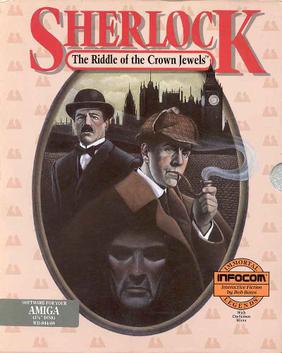
Sherlock: The Riddle of the Crown Jewels is an interactive fiction game designed by Bob Bates and published by Infocom in 1987. It was released for the Apple II, MS-DOS Commodore 64, Amiga, and Mac. Sherlock is based on the legendary fictional detective Sherlock Holmes, created by Sir Arthur Conan Doyle. It is Infocom's thirty-first game and is the first of two Infocom games developed by Challenge, Inc. using Infocom's development tools.
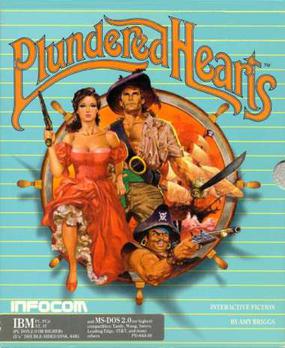
Plundered Hearts is an interactive fiction video game created by Amy Briggs and published by Infocom in 1987. Infocom's only game in the romance genre, it was released simultaneously for the Apple II, Commodore 64, Atari 8-bit computers, Atari ST, Amiga, Mac, and MS-DOS. It is Infocom's 28th game.

James Clavell's Shōgun is an interactive fiction game written by Dave Lebling and published by Infocom in 1989. It was released for the Amiga, Apple II, MS-DOS, and Mac. The game is based on the 1975 novel Shōgun by James Clavell. It was Infocom's thirty-third game.
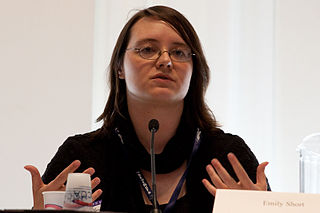
Emily Short is an interactive fiction (IF) writer. From 2020 to 2023, she was creative director of Failbetter Games, the studio behind Fallen London and its spinoffs.
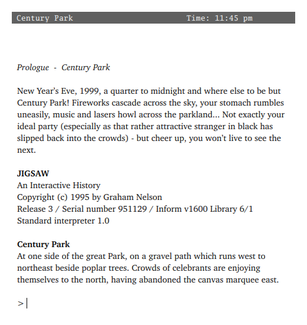
Jigsaw is an interactive fiction (IF) game, written by Graham Nelson in 1995.

Violet is a work of interactive fiction by American author Jeremy Freese. It is a one-room puzzle game.
Spectrobes is a video game franchise consisting of three installments, the most recent of which was released in 2009.
The Nebula Award for Best Game Writing is one of the Nebula Awards, presented each year by the Science Fiction and Fantasy Writers Association (SFWA) for science fiction or fantasy game writing. The Nebula Awards have been described as one of "the most important of the American science fiction awards" and "the science-fiction and fantasy equivalent" of the Emmy Awards. The Game Writing category is the newest category of the Nebulas, which were originally awarded in 1966 solely for printed fiction. The Nebula Award for Best Game Writing has been awarded annually since 2019. The drive to create the Game Writing category was promoted by then SFWA president Cat Rambo after game writers were made eligible for SFWA membership in 2016. According to a statement by SFWA when the category was announced in 2018, it was added to reflect how changes in technology had expanded the media used for science fiction and fantasy storytelling.